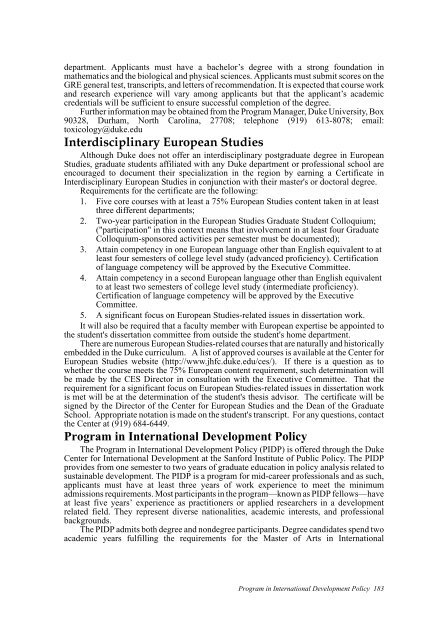2005-06 - Office of the Registrar - Duke University
2005-06 - Office of the Registrar - Duke University
2005-06 - Office of the Registrar - Duke University
You also want an ePaper? Increase the reach of your titles
YUMPU automatically turns print PDFs into web optimized ePapers that Google loves.
department. Applicants must have a bachelor’s degree with a strong foundation in<br />
ma<strong>the</strong>matics and <strong>the</strong> biological and physical sciences. Applicants must submit scores on <strong>the</strong><br />
GRE general test, transcripts, and letters <strong>of</strong> recommendation. It is expected that course work<br />
and research experience will vary among applicants but that <strong>the</strong> applicant’s academic<br />
credentials will be sufficient to ensure successful completion <strong>of</strong> <strong>the</strong> degree.<br />
Fur<strong>the</strong>r information may be obtained from <strong>the</strong> Program Manager, <strong>Duke</strong> <strong>University</strong>, Box<br />
90328, Durham, North Carolina, 27708; telephone (919) 613-8078; email:<br />
toxicology@duke.edu<br />
Interdisciplinary European Studies<br />
Although <strong>Duke</strong> does not <strong>of</strong>fer an interdisciplinary postgraduate degree in European<br />
Studies, graduate students affiliated with any <strong>Duke</strong> department or pr<strong>of</strong>essional school are<br />
encouraged to document <strong>the</strong>ir specialization in <strong>the</strong> region by earning a Certificate in<br />
Interdisciplinary European Studies in conjunction with <strong>the</strong>ir master's or doctoral degree.<br />
Requirements for <strong>the</strong> certificate are <strong>the</strong> following:<br />
1. Five core courses with at least a 75% European Studies content taken in at least<br />
three different departments;<br />
2. Two-year participation in <strong>the</strong> European Studies Graduate Student Colloquium;<br />
("participation" in this context means that involvement in at least four Graduate<br />
Colloquium-sponsored activities per semester must be documented);<br />
3. Attain competency in one European language o<strong>the</strong>r than English equivalent to at<br />
least four semesters <strong>of</strong> college level study (advanced pr<strong>of</strong>iciency). Certification<br />
<strong>of</strong> language competency will be approved by <strong>the</strong> Executive Committee.<br />
4. Attain competency in a second European language o<strong>the</strong>r than English equivalent<br />
to at least two semesters <strong>of</strong> college level study (intermediate pr<strong>of</strong>iciency).<br />
Certification <strong>of</strong> language competency will be approved by <strong>the</strong> Executive<br />
Committee.<br />
5. A significant focus on European Studies-related issues in dissertation work.<br />
It will also be required that a faculty member with European expertise be appointed to<br />
<strong>the</strong> student's dissertation committee from outside <strong>the</strong> student's home department.<br />
There are numerous European Studies-related courses that are naturally and historically<br />
embedded in <strong>the</strong> <strong>Duke</strong> curriculum. A list <strong>of</strong> approved courses is available at <strong>the</strong> Center for<br />
European Studies website (http://www.jhfc.duke.edu/ces/). If <strong>the</strong>re is a question as to<br />
whe<strong>the</strong>r <strong>the</strong> course meets <strong>the</strong> 75% European content requirement, such determination will<br />
be made by <strong>the</strong> CES Director in consultation with <strong>the</strong> Executive Committee. That <strong>the</strong><br />
requirement for a significant focus on European Studies-related issues in dissertation work<br />
is met will be at <strong>the</strong> determination <strong>of</strong> <strong>the</strong> student's <strong>the</strong>sis advisor. The certificate will be<br />
signed by <strong>the</strong> Director <strong>of</strong> <strong>the</strong> Center for European Studies and <strong>the</strong> Dean <strong>of</strong> <strong>the</strong> Graduate<br />
School. Appropriate notation is made on <strong>the</strong> student's transcript. For any questions, contact<br />
<strong>the</strong> Center at (919) 684-6449.<br />
Program in International Development Policy<br />
The Program in International Development Policy (PIDP) is <strong>of</strong>fered through <strong>the</strong> <strong>Duke</strong><br />
Center for International Development at <strong>the</strong> Sanford Institute <strong>of</strong> Public Policy. The PIDP<br />
provides from one semester to two years <strong>of</strong> graduate education in policy analysis related to<br />
sustainable development. The PIDP is a program for mid-career pr<strong>of</strong>essionals and as such,<br />
applicants must have at least three years <strong>of</strong> work experience to meet <strong>the</strong> minimum<br />
admissions requirements. Most participants in <strong>the</strong> program—known as PIDP fellows—have<br />
at least five years’ experience as practitioners or applied researchers in a development<br />
related field. They represent diverse nationalities, academic interests, and pr<strong>of</strong>essional<br />
backgrounds.<br />
The PIDP admits both degree and nondegree participants. Degree candidates spend two<br />
academic years fulfilling <strong>the</strong> requirements for <strong>the</strong> Master <strong>of</strong> Arts in International<br />
Program in International Development Policy 183









